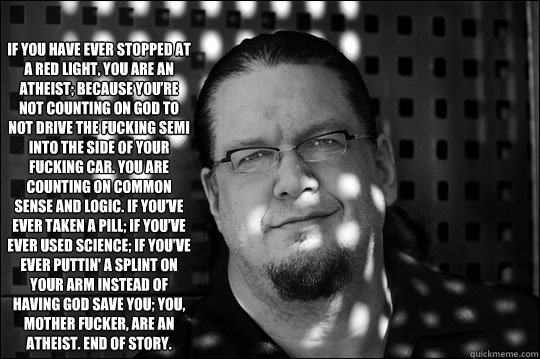BassCadet wrote:
They’re two totally different aspects of inquiry. Evolution is a wonderful theory and I subscribe to it, but it doesn’t attempt to explain why there is an evolutionary mechanism in place to begin with. For instance, why did living beings develop eyes or ears or any sensory organs? How did the primordial soup suddenly realize, “There is an observable universe that I want to see, so I’ll evolve myself an eyeball to translate lightwaves into the viewable spectrum.” Same goes for hearing.
There are a few things I disagree with here. Firstly, we can explain why evolution exists. It exists because things like biochemistry and statistical mathematics tell us it should. As for why biochemistry exists, that's because of chemistry. Chemistry exists because of physics, and both physics and mathematics exist because they appear to be fundamental parts of our universe. That's where you should direct your 'why' question. We know why such a thing as evolution exists, but we don't know why our universe is the way it is (at least not on a fundamental level).
As for why organisms developed sensory organs, that's simply due to natural selection. In this case, evolution is both the 'how' and the 'why' (yes, science can answer 'why' questions. Not everything requires a philosophical explanation). Organisms who had better mechanisms for detecting their environment and reacting to it would be more successful in finding food or escaping predators, so organisms with those mechanisms would be more likely to reproduce and pass the mechanisms on to the next generation. It wouldn't have been anywhere near as sudden as you made it seem. Things like ears and eyes are extremely complicated sensory organs that could only develop over millions of years, and the first sensory organs would have been much, much simpler (to the point where it would be incorrect to call them 'organs' in the first place). Also, you've assumed there was some kind of conscious intent when evolving these mechanisms. This simply wasn't the case. Nothing ever decides to evolve, it's just a thing that happens.
Let’s just try to get on the same playing field that order does not emerge from chaos without willed force.
Sorry, but that's a big assumption, and one that I'm not willing to accept. We see examples of order arising from chaos on a daily basis. For example. plants take in sunlight and use the energy to grow, and I think we can all agree that plants are more ordered than the random scattering of atoms of photons that are required to make them. There are many more physical phenomena in which order arises spontaneously, so there's no reason to assume that conscious intervention is required to produce order.



